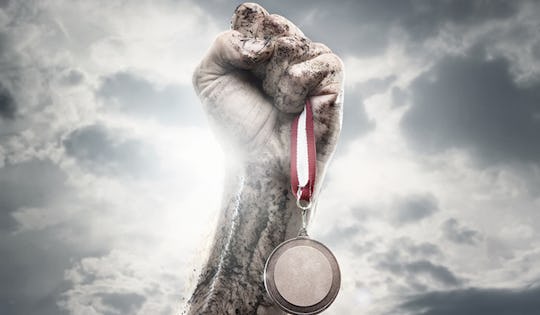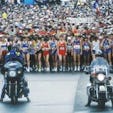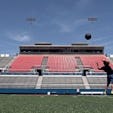Since I have reached the age of 70, several realities of staying athletically active have become apparent. As we age, we lose both flexibility and muscle strength. In order to stay competitive, it is necessary to cross train in order to win races.Stretching every day becomes a necessity in order to maintain your range of motion. Weight training on a regular basis is necessary to maintain muscle mass.
After the Olympics I kept active with rowing, bike riding, skiing, and a lot of running. At the time I ended my Olympic rowing career there was no such thing as master’s rowing, so I immersed myself in distance running and entered multiple 10K, half marathon, and marathon events. My training consisted of 50 to 60 running miles per week, and since my weight fluctuated from 220 to 240, I was putting a lot of stress on my joints.
Real marathon runners typically weigh 120 to 140 pounds. Over time I was accumulating running injuries and had some spectacular skiing and biking crashes, all of which combined to limit what I was capable of doing. Below you will find the top tips for decreasing risk of injury, increasing longevity and insuring you will remain a lifelong athlete.
Longevity Tip #1: Just stay active!
A primary key to longevity in sports is staying as active as possible throughout your life. If kids start sports at a young age, they become accustomed to regular practices and competition. This becomes a physically active routine that can carry on to adult life. The longer an individual is involved in competitive athletics, the easier it is to keep going after high school and college.
Longevity Tip #2: Pick up a sport!
There are many sports options. Pick ones that are fun and participate regularly. When I was in grade school I played baseball, football, skiing, and hockey. In high school I played football, basketball, and cricket. In college I was introduced to rowing which became my primary sport (although I still found time to play intramural hockey and football). The most important thing to staying active and competitive and sports is to find a sport that you truly enjoy and do it regularly. Enter competitions often to give yourself incentive to do the daily training with the proper intensity.
Longevity Tip #3: Rowing!
After graduating from college I trained for the Olympics in rowing. I made the team in 1968 in Mexico City. I won the bronze medal in double sculls. Twenty years after my Olympic career was over, I was reintroduced to rowing because a master’s competitive regatta system had been introduced. This was a lot of fun because rowing was a sport that I enjoyed the most and having regular competitions gave me a lot of incentive to train on a regular basis. The incentive came from not only wanting to win races, but to save the embarrassment of being smoked in races and having to suffer the subsequent verbal abuse from friends and rivals. I love to row and when I’m on the water I lose track of time and I never think “when is this going to be over.” Rowing, like cycling, is a low impact sport, so joints are not overstressed and damaged.
Longevity Tip #4: Cross-Training!
I like to cross train on the cross country ski machine and an indoor cycle. Both of these machines are very complimentary to rowing training and help develop muscle tone and core strength. Over the years I’ve tried lots of different cross training methods. I’ve kept the ones that help me the most and I have discarded the ones that were not effective (or that injured me). Find cross training methods that complement your sport and improve your performance; adding variety will help maintain your interest.
Final Thoughts
Whether it is rowing, cycling, playing a sport or just getting outside and walking, always stay active. Try not to take off exercising for long periods of time, because you’ll experience what I like to call “the Jell-O syndrome” (when the muscles you’re not using turn into Jell-O). You also lose conditioning faster and faster with each year, but it takes you longer and longer to get back in shape, so stay consistently active!

)





